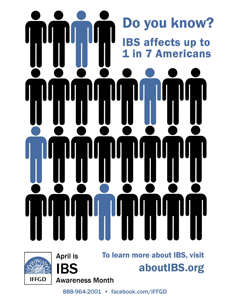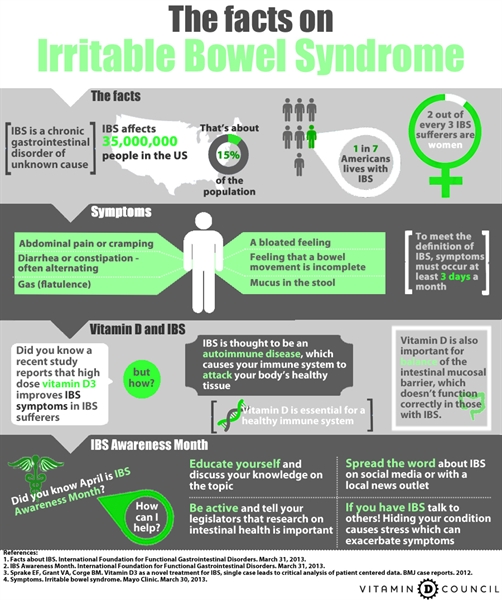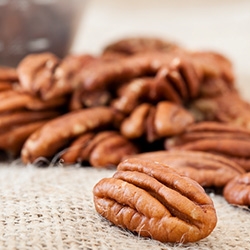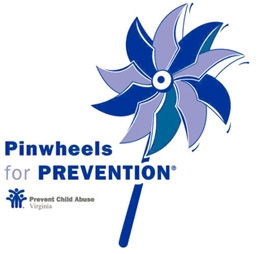Irritable Bowel Syndrome Month on April, 2025: IS THIS IRRITABLE BOWEL SYNDROME OR NOT?
April, 2025 is Irritable Bowel Syndrome Month 2025. IBS Symptoms Visit us if you're feeling symptoms of irritable bowel syndrome.
As an Amazon Associate I earn from qualifying purchases.

Irritable Bowel Syndrome (IBS) is a very complex problem and there is no cure for it. You first need to talk with your doctor and make sure he gave you an accurate IBS diagnosis. In order to be given a clear diagnosis of IBS; there are a battery of tests to take and they all should rule out more serious problems, For more information on the tests to take visit www.TheIBSFormula.com. Once you have been given a clear diagnosis of IBS then you will have to figure out what is causing the IBS symptoms. Many IBS triggers can be found in the food you eat and the lifestyle you lead. The book "The IBS Formula" gives you an up to date look at IBS, what causes it and how to take control of your life from these symptoms.

Irritable bowel syndrome?
The medical community has no idea what is IBS, what causes IBS. My friends daughter's diagnosis was IBS. After my friend spent Rs. 50K on various tests, he was told by doctors that she has problem in her mind and he should take his daughter to psychiatric.
Let me try to define the problem and give a solution.
People feel sleepy after they eat in excess or take too much of alcohol or sweets.
What is the reason for feeling sleepy? Again medical community is silent on this as well. But they give medicines for this as well? Should we really allow the doctors to give medicines when they do not know the basic underlying reason????
When a person eats something, it needs to be digested. The digestion process is know to be very energy intensive. When the body falls short of resources to digest the food, it tires out and sleeps. This shuts down the operations of the body except heart, kidney and other essential functions / organs.
When a person indulges into eating, drinking sessions which does not create enough energy resources, he becomes weak. After this whatever he eats is simply passed out immediately.
Over past 5-6 years I carried out various hit and trial experiments on IBS. I got success when I tried the following on a 19 year old boy.
This boy weighed 43kg, 5ft 8 inches height, total body water was 68%, muscles less then 5%.
I asked him to drink one glass of water 1 hour before each meal. Next day he told me that he got complete relief. But after 3 days he said his condition has gone back to old status.
Now I asked him to give up water and all liquids for 48 hours. The results shocked me. He was completely cured of the following -
IBS and mouth ulcers in 48 hours. Pain in legs after 6-8 months. I followed up with this person for next 15 months. There were 3 instances of IBS lasting 1-2 days on 3 occassions. The solution was change in water drinking habits. When he was on low water intake, he was advised to drink more water for 2-3 days. When he was on higher water intake he was advised to cut down on water intake.
It gave him complete relief.
I applied the same solution on 2 more person of 18-20 years of age. It worked simply by cutting down on water intake.
Now if you decided to try it the next problem is that one who is used to drinking water or other liquids and feel thirsty quite often.
First thing in the morning drink tea (on empty stomach). One should not take anything with tea. Tea on empty stomach leaves a bitter taste in mouth. Resist drinking water or any other liquid for next 3-4 hours. After this the bitter taste will be gone. AFter this there will be no thirst signals. For the next 48 hours there will be enough fluid in your mouth and food pipe. You can eat your normal meals minus any liquids for next 24 hours.
After having gone thru the above process go without water and liquids again after 2-3 days without taking tea first thing in the morning.
If the above does not give complete relief. Add salt to the water the next day after going without water. 3 grams of salt with 1 glass of water. 4-5 times in a day. Salt is a purifier and it will resolve the problems better. You will have to continue drinking water 1 hour before meal.

is (IBS) irritable bowel syndrome curable ?
What is irritable bowel syndrome (IBS)?
Irritable bowel syndrome is a disorder characterized most commonly by cramping, abdominal pain, bloating, constipation, and diarrhea. IBS causes a great deal of discomfort and distress, but it does not permanently harm the intestines and does not lead to a serious disease, such as cancer. Most people can control their symptoms with diet, stress management, and prescribed medications. For some people, however, IBS can be disabling. They may be unable to work, attend social events, or even travel short distances.
As many as 20 percent of the adult population, or one in five Americans, have symptoms of IBS, making it one of the most common disorders diagnosed by doctors. It occurs more often in women than in men, and it begins before the age of 35 in about 50 percent of people.
What are the symptoms of IBS?
Abdominal pain, bloating, and discomfort are the main symptoms of IBS. However, symptoms can vary from person to person. Some people have constipation, which means hard, difficult-to-pass, or infrequent bowel movements. Often these people report straining and cramping when trying to have a bowel movement but cannot eliminate any stool, or they are able to eliminate only a small amount. If they are able to have a bowel movement, there may be mucus in it, which is a fluid that moistens and protect passages in the digestive system. Some people with IBS experience diarrhea, which is frequent, loose, watery, stools. People with diarrhea frequently feel an urgent and uncontrollable need to have a bowel movement. Other people with IBS alternate between constipation and diarrhea. Sometimes people find that their symptoms subside for a few months and then return, while others report a constant worsening of symptoms over time.
What causes IBS?
Researchers have yet to discover any specific cause for IBS. One theory is that people who suffer from IBS have a colon, or large intestine, that is particularly sensitive and reactive to certain foods and stress. The immune system, which fights infection, may also be involved.
Normal motility, or movement, may not be present in the colon of a person who has IBS. It can be spasmodic or can even stop working temporarily. Spasms are sudden strong muscle contractions that come and go.
The lining of the colon called the epithelium, which is affected by the immune and nervous systems, regulates the flow of fluids in and out of the colon. In IBS, the epithelium appears to work properly. However, when the contents inside the colon move too quickly, the colon loses its ability to absorb fluids. The result is too much fluid in the stool. In other people, the movement inside the colon is too slow, which causes extra fluid to be absorbed. As a result, a person develops constipation.
A person’s colon may respond strongly to stimuli such as certain foods or stress that would not bother most people.
Recent research has reported that serotonin is linked with normal gastrointestinal (GI) functioning. Serotonin is a neurotransmitter, or chemical, that delivers messages from one part of your body to another. Ninety-five percent of the serotonin in your body is located in the GI tract, and the other 5 percent is found in the brain. Cells that line the inside of the bowel work as transporters and carry the serotonin out of the GI tract. People with IBS, however, have diminished receptor activity, causing abnormal levels of serotonin to exist in the GI tract. As a result, they experience problems with bowel movement, motility, and sensation—having more sensitive pain receptors in their GI tract.
Researchers have reported that IBS may be caused by a bacterial infection in the gastrointestinal tract. Studies show that people who have had gastroenteritis sometimes develop IBS, otherwise called post-infectious IBS.
Researchers have also found very mild celiac disease in some people with symptoms similar to IBS. People with celiac disease cannot digest gluten, a substance found in wheat, rye, and barley. People with celiac disease cannot eat these foods without becoming very sick because their immune system responds by damaging the small intestine. A blood test can determine whether celiac disease may be present. (For information about celiac disease, see the NIDDK’s Celiac Disease fact sheet.)
What is celiac disease?
Celiac disease is a digestive disease that damages the small intestine and interferes with absorption of nutrients from food. People who have celiac disease cannot tolerate a protein called gluten, found in wheat, rye, and barley. Gluten is found mainly in foods but may also be found in products we use every day, such as stamp and envelope adhesive, medicines, and vitamins.
When people with celiac disease eat foods or use products containing gluten, their immune system responds by damaging the small intestine. The tiny, fingerlike protrusions lining the small intestine are damaged or destroyed. Called villi, they normally allow nutrients from food to be absorbed into the bloodstream. Without healthy villi, a person becomes malnourished, regardless of the quantity of food eaten.
Because the body’s own immune system causes the damage, celiac disease is considered an autoimmune disorder. However, it is also classified as a disease of malabsorption because nutrients are not absorbed. Celiac disease is also known as celiac sprue, nontropical sprue, and gluten-sensitive enteropathy.
Celiac disease is a genetic disease, meaning it runs in families. Sometimes the disease is triggered—or becomes active for the first time—after surgery, pregnancy, childbirth, viral infection, or severe emotional stress.
What are the symptoms of celiac disease?
Celiac disease affects people differently. Symptoms may occur in the digestive system, or in other parts of the body. For example, one person might have diarrhea and abdominal pain, while another person may be irritable or depressed. In fact, irritability is one of the most common symptoms in children.
Symptoms of celiac disease may include one or more of the following:
gas
recurring abdominal bloating and pain
chronic diarrhea
constipation
pale, foul-smelling, or fatty stool
weight loss/weight gain
fatigue
unexplained anemia (a low count of red blood cells causing fatigue)
bone or joint pain
osteoporosis, osteopenia
behavioral changes
tingling numbness in the legs (from nerve damage)
muscle cramps
seizures
missed menstrual periods (often because of excessive weight loss)
infertility, recurrent miscarriage
delayed growth
failure to thrive in infants
pale sores inside the mouth, called aphthous ulcers
tooth discoloration or loss of enamel
itchy skin rash called dermatitis herpetiformis
A person with celiac disease may have no symptoms. People without symptoms are still at risk for the complications of celiac disease, including malnutrition. The longer a person goes undiagnosed and untreated, the greater the chance of developing malnutrition and other complications. Anemia, delayed growth, and weight loss are signs of malnutrition: The body is just not getting enough nutrients. Malnutrition is a serious problem for children because they need adequate nutrition to develop properly. (See Complications.)
What are the complications of celiac disease?
Damage to the small intestine and the resulting nutrient absorption problems put a person with celiac disease at risk for malnutrition, anemia, and several other diseases and health problems.
Lymphoma and adenocarcinoma are cancers that can develop in the intestine.
Osteoporosis is a condition in which the bones become weak, brittle, and prone to breaking. Poor calcium absorption contributes to osteoporosis.
Miscarriage and congenital malformation of the baby, such as neural tube defects, are risks for pregnant women with untreated celiac disease because of nutrient absorption problems.
Short stature refers to being significantly under the average height. Short stature results when childhood celiac disease prevents nutrient absorption during the years when nutrition is critical to a child’s normal growth and development. Children who are diagnosed and treated before their growth stops may have a catch-up period.
How common is celiac disease?
Data on the prevalence of celiac disease is spotty. In Italy about 1 in 250 people, and in Ireland about 1 in 300 people, have celiac disease. Recent studies have shown that it may be more common in Africa, South America, and Asia than previously believed.
Until recently, celiac disease was thought to be uncommon in the United States. However, studies have shown that celiac disease is very common. Recent findings estimate about 2 million people in the United States have celiac disease, or about 1 in 133 people. Among people who have a first-degree relative diagnosed with celiac disease, as many as 1 in 22 people may have the disease.
Celiac disease could be underdiagnosed in the United States for a number of reasons including:
Celiac symptoms can be attributed to other problems.
Many doctors and health care providers are not knowledgeable about the disease.
Only a small number of U.S. laboratories are experienced and skilled in testing for celiac disease.
More research is needed to learn the true prevalence of celiac disease among Americans.
Diseases Linked to Celiac Disease
People with celiac disease tend to have other autoimmune diseases. The connection between celiac disease and these diseases may be genetic. These diseases include
thyroid disease
systemic lupus erythematosus
type 1 diabetes
liver disease
collagen vascular disease
rheumatoid arthritis
Sjögren’s syndrome
Dermatitis Herpetiformis
Dermatitis herpetiformis (DH) is a severe, itchy, blistering skin manifestation of celiac disease. Not all people with celiac disease develop dermatitis herpetiformis. The rash usually occurs on


















